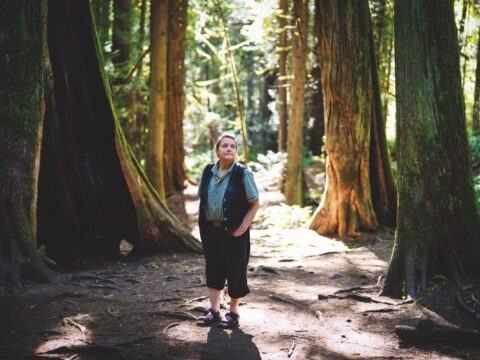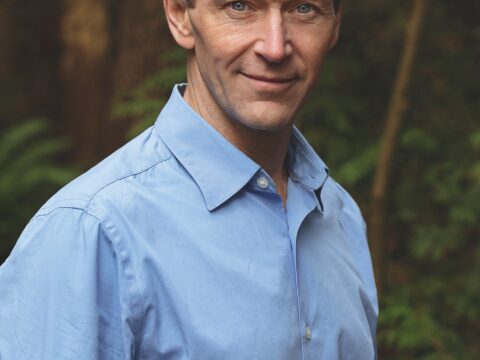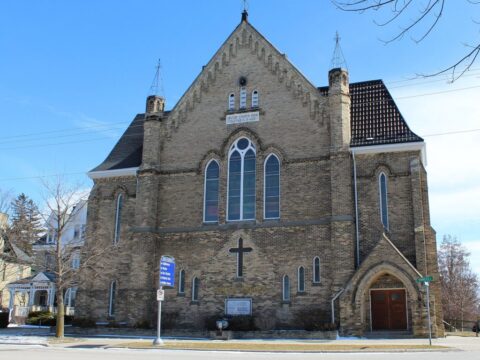Lully, lullay, thou little tiny child / Bye bye, lully, lullay.” So goes the first lines of a beautiful and haunting Christmas carol from the early 16th century called The Coventry Carol. The song feels like a lullaby, sung by a parent rocking a child. There is a gentleness that, like many carols, reminds us of the beauty of the Christmas narrative as shared by the Gospel writers. But listen closely to the lyrics and you’ll hear a surprising harshness: “Herod the King, in his raging / Charged he has, this day / His men of might in his own sight / All young children to slay.”
This carol is commemorating a part of the Christmas story that often gets glossed over. The Gospel of Matthew tells us that King Herod, furious and afraid when the Wise Ones did not return with the location of the new king, ordered the massacre of all children two years and younger in and around Bethlehem. Jesus was no longer there: after a warning by a divine messenger, his parents carried him to Egypt and sought refuge there. But even with Jesus’ escape, King Herod’s orders would have meant the deaths of many others. The sadness of this story is amplified by the carol’s minor key. The song ends with the listener feeling disquieted, with no resolution to either the music or the story.
While biblical scholars question the historical veracity of this massacre, it speaks to a truth that is both ancient and contemporary. When power is coupled with fear, it is the innocents — especially the children — who suffer.
The past couple of years have once again opened our hearts to this reality. Wars have caused death both directly and through massive social upheaval. Climate change has continued to accelerate, with people losing their homes in British Columbia as forest fires burn and with others around the world forced to migrate due to lack of food and shelter. Indigenous communities’ uncovering of unmarked and unreported graves has brought back into the light the genocide caused by Canada’s church-run residential institutions. The longtime and ongoing realities of racism and white supremacy — ingrained in Canada’s structures, institutions, cultural narratives and lives — cause economic and social disparity that often leads to broken health and life. Vaccine injustice means that the richest countries are considering COVID-19 booster shots while much of the world’s population continues to wait for a first dose.
As Christians enter into Advent and prepare to celebrate the coming of the Christ child, we need to make sure that we’re telling the whole story. If we’re going to sing, “Silent night, holy night / All is calm, all is bright,” we also need to sing, “Oh woe is me, poor child, for thee.” If we’re going to read Mary’s response to the divine messenger’s request that she be the mother of God’s child, then we also need to read her declaration that God “has brought down rulers from their thrones, but has lifted up the humble…has filled the hungry with good things, but sent the rich away empty.” If we’re going to be filled with joy and wonder at the divine army singing in the night sky and the shepherds going to the stable to greet the newborn child, then we also need to be struck by Herod and the powers that be raging, afraid of the possibility of losing their control.
Then, as individuals and as communities of Jesus’ disciples, we need to ask ourselves where we fit into this story. As much as I would like to see myself in the shepherds or in Joseph or Mary, I also know that I am Herod, so tied to the power and privilege that I have because of my social location that I am willing to do great damage to keep it. I wonder, too, if I am one of the Wise Ones, heading off in another direction so I can save myself, but also not confronting power with my own strength. I ask myself if, sometimes, I want to keep my childhood understandings of the Christmas story so that I don’t have to deal with the transformation of myself that Jesus’ birth, life, teaching, death and resurrection call me to live.
As much as I would like to see myself in the shepherds or in Joseph or Mary, I also know that I am Herod, so tied to the power and privilege that I have because of my social location that I am willing to do great damage to keep it.
We can choose to be passive observers, simply looking at the beauty of the story, or we can experience the story through the lens of Jesus’ life and invitation to follow him. That invitation calls us not only to read more deeply, but to be challenged and changed by what is at the centre of the Christmas story: the birth of Jesus Christ. Christmas is beautiful. But like any birth story, it is about so much more than beauty. It’s about life.
What might living the fullness of Christmas mean to disciples of Jesus and communities of faith committed to living his way? In 1973, Rev. Howard Thurman, a Black pastor, theologian and civil rights activist in the United States, wrote a poem that is often sung as another Christmas carol: “When the song of the angels is stilled, when the star in the sky is gone, when the kings and the princes are home, when the shepherds are back with their flocks, the work of Christmas begins: to find the lost, to heal the broken, to feed the hungry, to release the prisoner, to rebuild the nations, to bring peace among the people, to make music in the heart.

Over the course of the COVID-19 pandemic, communities of faith found themselves scrambling to live their ministries in times of physical distancing and lockdown. Ministers and councils searched for ways for people to worship together when “together” couldn’t mean being in the same space. Outreach ministries had to find ways to safely serve the needs of people made more vulnerable by the pandemic. Many turned to technology to stay in touch. Often, congregations found connections with others outside of their geographic region, sometimes even worshipping with people from the other side of the world. A lot of energy was put into helping us stay together as communities of faith, and as people who care about and for one another.
But by necessity, much of the ministry that had been done in the past needed to be left to sit. Many of our ministries contracted, as individuals and communities of faith were forced to pull themselves inward by the restrictions of the pandemic. Even as we watched what was happening in our own communities, in Canada and around the world, many found themselves held back.
More on Broadview:
- My first Christmas in Canada was a disappointment, but it taught me so much
- What to do with your grief when a church closes
- 12 acts of kindness for the holidays and beyond
That’s been a big part of our story for the past year and a half. In Canada, with a large majority of people age 12 and older vaccinated against the COVID-19 virus and its current variants, we are finding ourselves in a new relationship with the pandemic, one that allows us to live parts of our lives and ministries in closer physical connection. As this reality settles in, it becomes even more important that we consider what it means to be a people transformed by Christmas — by God’s presence made tangible in the world in the birth of Jesus.
Will we be people who only look for the pretty parts of the story, or will we be people who look at both the joy and the pain to search for God’s presence? Will we be people who only see ourselves in the sympathetic characters, or will we recognize ourselves in the villains as well? Will we simply be observers of Jesus’ story, or will we be people whose lives are lived as part of the story? Will we be people who are ready to do, as Thurman put it, “the work of Christmas”?
In the end, whatever carols we sing, whatever version of the Christmas story we read, it is all a call to new life. It is all a call to transformation: of us as individuals, of our institutions and of the world. It is a call to respond to fear and to power with hope and wonder, and in so doing, make a difference that brings healing and abundant life — for all of God’s world.
***
Rt. Rev. Richard Bott is the 43rd moderator of The United Church of Canada.
This story was first published in Broadview’s December 2021 issue with the title “The work of Christmas.”
















I will continue to sing Silent Night. As a believer in Christ we need to recognize that God is in control of pandemics, world conflicts and the environment. As a believer, we are not “of this world”, but “in this world”. True Christians need to focus on the goal, not on the surroundings. As Paul writes ““I press on toward the goal to win the prize for which God has called me heavenward in Christ Jesus.” Philippians 3:14
We need to remind ourselves why we celebrate Christmas; it was “Good News” for all mankind, that a Saviour who later defeated death for our sake, came into the world. And we need to “Go Tell It On The Mountain” as “great is our joy” in the Lord.
You need to apply your questions to your own denomination. Will you remain a denomination that celebrates victimology by promoting racism in your implicit support of critical race theory or will you bow before Christ who invited everyone into God’s family? Will you remain a denomination that celebrates atheists who are ordained ministers who despise the incarnation of God in Jesus? Let’s see you clean your own soul as a denomination at Christmas
Thank you to Moderator, Richard Bott and to you, Broadview, for stimulating our senses through the written word. The story of Christ is a living, breathing story of a committed life to God, to Faith, to Family and to Community.
Thank you for bringing to our psyche the question how do we, personally, fit into the Christmas story? The answer is a sacred soulful decision and call to action in our every day lives.
May each person’s life be blessed with the grace of God to recommit to following Christ at Christmas and the every days which will unfold.
In God’s name we trust.
Rev. Bott thank you for the work you have done this year, God is trying to assist you in your endeavours. Our church and congregation has been trying to work with a rastafarian missionary with a socio-political agenda that sidesteps God and Jesus. Who needs Saturday Night Live when we have Sunday Morning Live on zoom and in the “sanctuary”. The spiritual and emotional gymnastics of watching a person give messages at Christmas time and Easter, when they don’t believe what they are saying unless it is their political or gender transformational belief is our form of christian comedy relief. It is true that comedy and tragedy, the happy, sad emotions that drinking wine (or legalized marijauna) can bring. Also linked to the greek god Janus which is known as the two faced God of beginnings. I hope in the new year we are discerning as to which god we believe in, and follow.